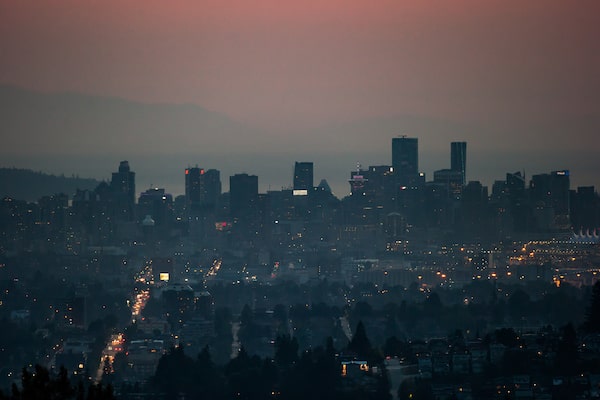
The 7-per-cent increase approved by Vancouver’s council was not originally intended to cover emergencies.DARRYL DYCK/The Canadian Press
Adrienne Tanner is a Vancouver journalist who writes about civic affairs
In those heady pre-pandemic days of 2020, when it seemed B.C. might dodge the brunt of COVID-19, the City of Langley approved a 6.67-per-cent property tax increase. It was money to be used, along with an additional $50-million borrowed over five years, to prepare for the arrival of a new SkyTrain line from Surrey.
Then the virus hit, and the economic landscape shifted so drastically, council decided to reconsider the budget and drop the residential tax increase to 1.83 per cent. The planned 7-per-cent increase for business and light industrial properties was similarly lowered to an average of about 2 per cent. Borrowing plans were put on hold for a year.
“We had big plans for this downtown core, and we still do,” Mayor Val van den Broek says ruefully. But with residents thrown out of work and struggling to pay bills, council could no longer defend an increase of that magnitude.
Other municipalities, such as Port Coquitlam, Delta, and North Vancouver, have also scaled back or eliminated proposed tax increases. So far, the outlier is Vancouver, which seems to be holding firm to its 7-per-cent property tax increase.
You could argue it is not reasonable to compare Vancouver to its suburban counterparts. The challenge and expense associated with trying to house and prevent death within a large homeless population has been amplified by the pandemic, which if it spread in the Downtown Eastside, would devastate the neighbourhood’s vulnerable population.
But the 7-per-cent increase approved by Vancouver’s council was not originally intended to cover emergencies. It was an appeasement budget, split along party lines. Councillors elected under the Non-Partisan Association banner voted no and the rest, including Mayor Kennedy Stewart, who lean further left, voted yes. It gave everyone who voted in favour money for pet projects, including the hiring of more police officers and firefighters, a city plan, and many environmental and social initiatives.
I was among those who considered this year’s budget too rich to begin with. Now, as we head into a recession and most people are looking for ways to cut costs, the optics are even worse. But so far, no one on council has proposed a budget review and it seems likely to pass next week with the 7-per-cent increase intact.
Except now, it is unclear how the money will be spent. The city has lost $5-million a week since the COVID-19 lockdown began, and it may be the entire increase and then some will be needed to maintain basic services.
Like his counterpart John Tory in Toronto, Mr. Stewart’s answer to Vancouver’s budget woes has been to press the provincial and federal governments for a bailout. B.C.’s provincial government is allowing Vancouver to run a deficit, and all municipalities to delay school tax remittances until year end. Apart from that, no other direct assistance has been announced.
Meanwhile, city staff are trimming around the edges with a hiring and travel ban and mandatory one unpaid day off for non-union staff in each 10-day pay period – equivalent to a 10-per-cent cut. Temporary layoff notices were issued to 1,800 unionized staff who will be called back when services reopen.
But the 7-per-cent hike remains and it will hit homeowners hard when the bill lands. This can only hurt the re-election chances of those who voted for it. Even before the pandemic hit, taxes and spending were fodder for criticism from NPA mayoral hopefuls Ken Sim and George Affleck. Mr. Sim, who ran against Mr. Stewart in 2018, has tweeted about “out of control taxes.” Mr. Affleck is now posting detailed lists of areas where he believes cuts and layoffs should be made. This line of attack will certainly continue.
Big-spending city councils can be politically popular in good times, if the taxes collected lead to visible accomplishments. But if the recession hits hard, it will be difficult for cities to accomplish much more than garbage pickup for the next two years. This will have voters thirsting for solid fiscal stewards, claiming to be able to do more with less. A 7-per-cent tax increase on top of a looming recession will put the NPA in a stronger position to make that case.
We have a weekly Western Canada newsletter written by our B.C. and Alberta bureau chiefs, providing a comprehensive package of the news you need to know about the region and its place in the issues facing Canada. Sign up today.